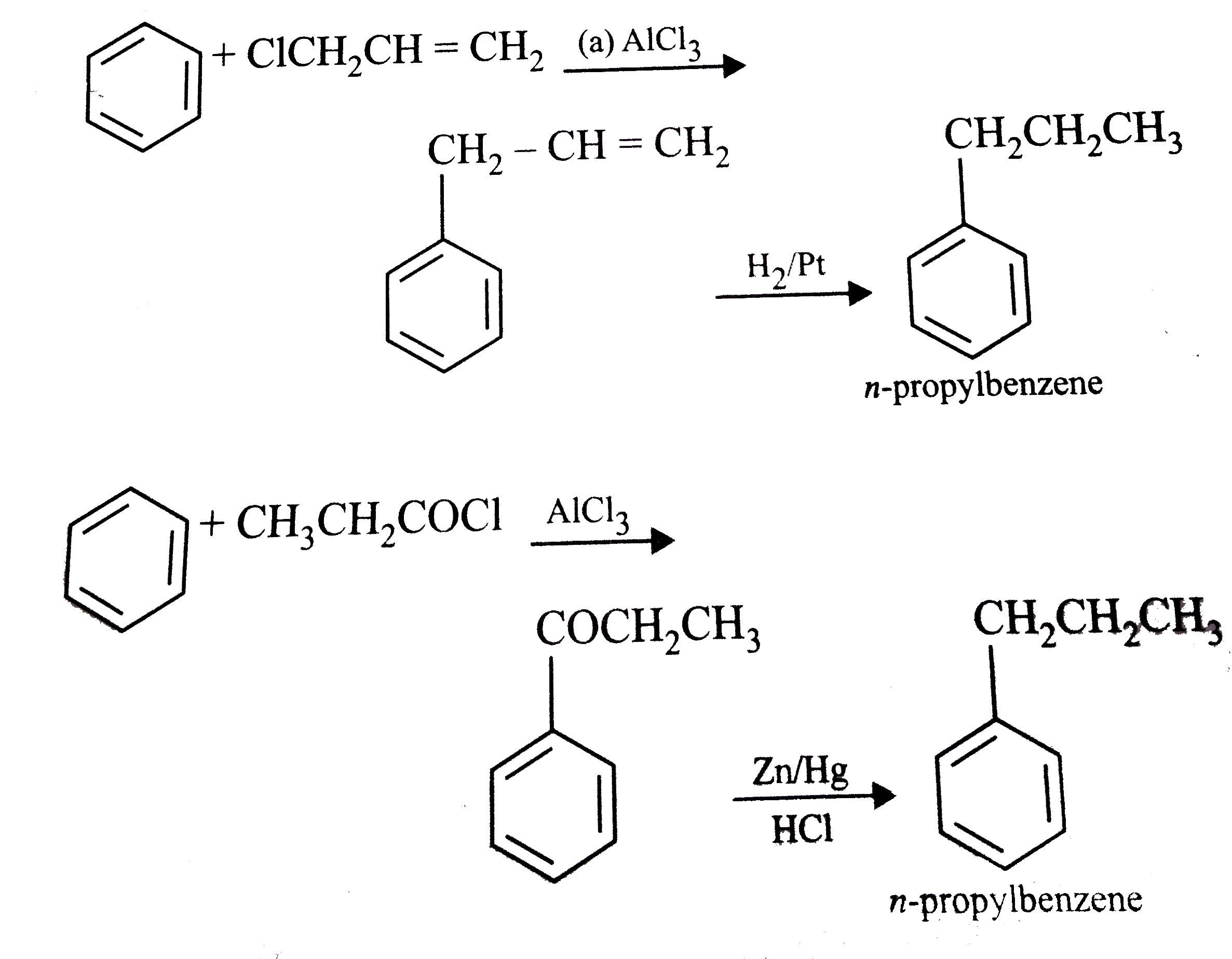n−Propyl benzene can be obtained in quantitative yield by following method :
(i) By treating benzene with n− propyl chloride in presence of AlCl3
(ii) By treating excess of benzene with n−propyl chloride in presence of AlCl3
(iii) By treating benzene with allyl chloride in presence of AlCl3 followed by reduction
(iv) By treating benzene with propionyl chloride in the presence of AlCl3 followed by Clemmensen reduction
A
By(ii),(iii) and (iv0
B
By (i),(iii) and (iv)
C
By (iii) and (iv)
D
By (ii) and (ii) only
Video Solution
Text Solution
The correct Answer is:c
(i) and (ii) methods will form isopropyl benzene because n− propyl carbocation, being less stable, rearranges to the more stable (2∘) isopropyl carbocation. Moreover, method (i) will lead to polyalkylation. Methods (ii) and (iv) can be used for preparing n− propyl benzene.

|
Updated on:21/07/2023
Topper's Solved these Questions
- BOOK - A2ZCHAPTER - HYDROCARBONSEXERCISE - Section B - Assertion Reasoning27videos
HYDROCARBONS
- BOOK - A2ZCHAPTER - HYDROCARBONSEXERCISE - AIPMT/NEET Questions36videos
HYDROCARBONS
- BOOK - A2ZCHAPTER - HYDROCARBONSEXERCISE - Method of Preparation of Alkynes59videos
HYDROCARBONS
- BOOK - A2ZCHAPTER - ENVIRONMENTAL CHEMISTRYEXERCISE - Section D - Chapter End Test30videos
ENVIRONMENTAL CHEMISTRY
- BOOK - A2ZCHAPTER - HYDROGENEXERCISE - Section D - Chapter End Test30videos
HYDROGEN
Similar Questions
Knowledge Check
- Question 1 - Select One
n- Prophylbenzene can be obtained in quantitative yield by
(i)treating benzene with n-propyl chloride in presence of AICI3
(ii)treating excess of benzene with n - prophyl chloride in presence of AICI3
(iii) treating benzene with allyl chloride in presence of AICI3 followed by reduction
(iv)treating benzene with propionyl chloride in presence of AICI3 followed by Clemmensen reductionAby (ii), (iii) and (iv)Bby (i), (iii) and (iv)Cby (iii)Dby (iv) - Question 2 - Select One
Ethylbenzene can be prepared from benzene by Friedel- Crafts reaction in the following manner.
(i) by treating with ethyl chloride in presence of AICI3
(ii) by treating excess of benzene with ethyl chloride in presence of AICI3
(iii) by treating benzene with vinyl chloride in presence of AICI3 followed by reduction
(iv) by acetylation of benzene followed by Clemmerisen reductionAby (iv)Bby(ii), (iii), and (iv)Cby (ii)Dby (iii) and (iv) - Question 3 - Select One
Benzene reacts with n-propyl chloride in the presence of anhydrous AlCl3 to give predominantly
A3 - Propyl - 1 -chlorobenzeneBn -PropylbenzeneCIsopropylbenzeneDNo reaction occurs
Nitrobenzene reacts with acetyl chloride in the presence of anhydrous AlCl3 to from
View SolutionBenzene reacts with acetyl chloride in the prescence of anhydrous AlCl3 to give
View SolutionWhat happens when aniline is treated with methyl chloride in presence of AlCl3 ?
View SolutionReaction of benzene with Me3COCl in the presence of anhydrous AlCl3 gives
View SolutionReaction of benzene with Me3CCOCl in the presence of anhydrous AlCl3 gives
View Solution
